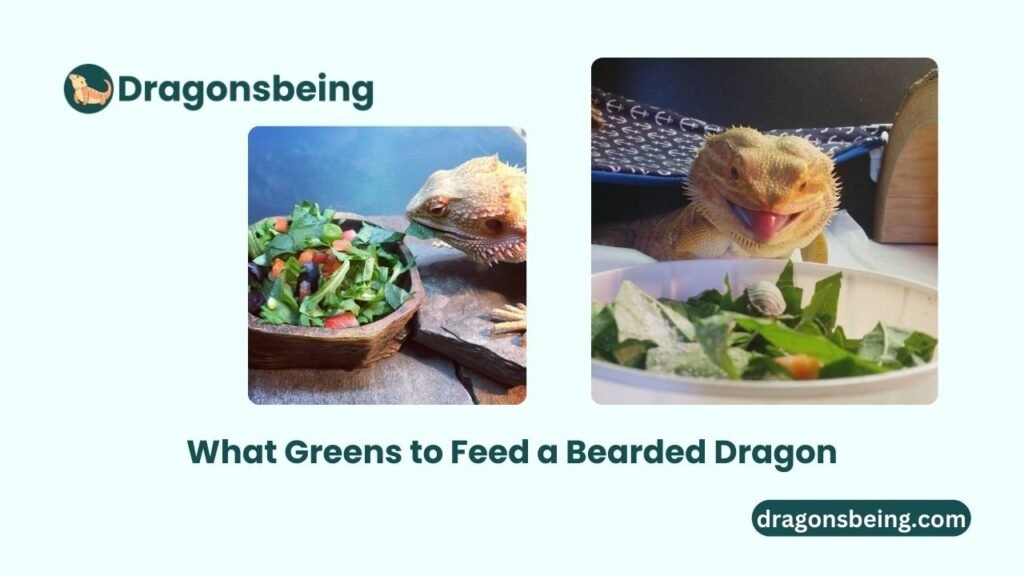Bearded dragons thrive on a variety of greens. Suitable options include collard greens, mustard greens, and dandelion greens.
Feeding your bearded dragon the right greens is crucial for their health and well-being. These reptiles require a balanced diet that includes both insects and fresh vegetables. Greens provide essential vitamins and minerals that support their immune system and overall growth.
Collard greens and mustard greens are excellent choices due to their high calcium content. Dandelion greens not only offer nutrients but also stimulate natural foraging behavior. Always wash greens thoroughly to remove pesticides and ensure they are fresh. Regularly varying the types of greens offered can prevent dietary boredom and promote a healthy appetite in your bearded dragon.
Introduction To Bearded Dragon Nutrition
Bearded dragons need a balanced diet for good health. Proper nutrition helps them grow, stay active, and live longer. Greens are a vital part of their meals. Understanding their nutritional needs is essential for every owner.
Essential Nutrients For Your Pet
Bearded dragons require several key nutrients:
- Vitamins: Essential for immune function and growth.
- Minerals: Calcium is crucial for bone health.
- Protein: Supports muscle development and energy.
- Fiber: Aids digestion and keeps the gut healthy.
Feeding a variety of foods ensures they receive all necessary nutrients. Fresh greens are a major source of vitamins and minerals. Always include safe greens in their diet.
The Role Of Greens In A Balanced Diet
Greens provide hydration and essential nutrients. They should make up a significant part of your bearded dragon’s diet.
| Type of Greens | Nutritional Benefits |
|---|---|
| Collard Greens | High in calcium and vitamins A and C. |
| Mustard Greens | Rich in vitamins and minerals, low in oxalates. |
| Dandelion Greens | Full of calcium and promotes healthy digestion. |
| Turnip Greens | Good source of calcium and vitamins. |
Offer a mix of these greens to keep meals exciting. Fresh, leafy greens prevent boredom and encourage eating. Avoid iceberg lettuce; it has little nutritional value.
Monitor your bearded dragon’s health. Adjust their diet based on activity level and age. A balanced diet leads to a happy, healthy pet.
Safe Leafy Greens For Bearded Dragons
Feeding your bearded dragon the right greens is essential. Leafy greens offer vital nutrients. They help maintain health and energy. Here are some safe options for your pet.
Mustard Greens And Their Benefits
Mustard greens are a fantastic choice for bearded dragons. They are rich in vitamins A, C, and K. These vitamins support good vision, immune function, and bone health.
- High in Calcium: Helps with bone strength.
- Low in Oxalates: Safe for regular feeding.
- Good Fiber Source: Aids digestion.
Consider these tips when feeding mustard greens:
- Wash greens thoroughly.
- Chop into small pieces.
- Mix with other greens for variety.
Collard Greens: A Staple For Reptiles
Collard greens are another excellent option. They are packed with nutrients. These greens offer calcium and vitamins A and C.
| Nutrient | Benefits |
|---|---|
| Calcium | Supports strong bones and teeth. |
| Vitamin A | Essential for vision and immune health. |
| Vitamin C | Boosts the immune system. |
Collard greens are easy to prepare. They can be fed daily. Just ensure to:
- Wash them properly.
- Chop into bite-sized pieces.
- Store leftovers in the fridge.
Offering these greens keeps your bearded dragon healthy and happy.
Occasional Greens To Mix Things Up
Variety is key for a healthy bearded dragon diet. Occasional greens add excitement and nutrition. These greens can enhance your dragon’s meals and provide essential vitamins. Let’s look at two great options: kale and Swiss chard.
Kale: A Nutritious Treat
Kale is a popular choice for many reptile owners. It is rich in vitamins A, C, and K. These nutrients support a bearded dragon’s overall health.
- Vitamin A: Supports vision and immune function.
- Vitamin C: Boosts immune health.
- Vitamin K: Aids in blood clotting.
Feed kale in moderation. Too much can lead to calcium issues. Chop it into small pieces for easy eating. Aim for one or two times a week.
Swiss Chard: A Colorful Addition
Swiss chard is not just pretty; it’s also nutritious. This leafy green adds color to your dragon’s plate. It contains vitamins A, C, and K, similar to kale.
| Nutrient | Benefits |
|---|---|
| Vitamin A | Supports eye health |
| Vitamin C | Enhances immune system |
| Vitamin K | Promotes healthy bones |
Limit Swiss chard to occasional feedings. It contains oxalates, which can bind calcium. Offer Swiss chard once a week to maintain balance.
Vegetables To Complement Leafy Greens
Feeding your bearded dragon a variety of vegetables is key. Leafy greens are great, but vegetables add important nutrients. They help maintain your dragon’s health and energy.
Butternut Squash For Vitamins
Butternut squash is a fantastic choice for bearded dragons. It is rich in vitamins A and C. These vitamins support vision and the immune system.
- Vitamin A: Helps with growth and skin health.
- Vitamin C: Boosts the immune system.
Butternut squash is also high in fiber. This promotes healthy digestion. You can serve it cooked or raw. Always cut it into small, manageable pieces.
Bell Peppers For Antioxidants
Bell peppers are colorful and nutritious. They provide antioxidants that protect cells. Antioxidants help combat diseases in bearded dragons.
| Color | Benefits |
|---|---|
| Red | Highest in Vitamin A and C |
| Yellow | Rich in Lutein for eye health |
| Green | Good source of fiber |
Chop bell peppers into small pieces. Offer them fresh and raw. Your bearded dragon will enjoy the crunch!
Herbs And Flowers As Nutritional Snacks
Herbs and flowers make excellent snacks for your bearded dragon. They offer flavor and essential nutrients. Incorporating these into their diet adds variety and excitement. Let’s explore some top choices.
Basil And Parsley: Flavorful And Healthy
Basil and parsley are popular herbs for bearded dragons. They provide various vitamins and minerals. Here are the benefits of each:
| Herb | Benefits |
|---|---|
| Basil |
|
| Parsley |
|
Chop these herbs finely. Mix them with other greens for a tasty treat.
Dandelion Flowers And Leaves: A Natural Food Source
Dandelion flowers and leaves are nutritious and safe. They grow abundantly in many areas. Both parts are edible and provide important nutrients. Here are some key points:
- High in calcium
- Rich in vitamins A and K
- Promotes healthy digestion
Be sure to pick dandelions from areas free of pesticides. Rinse them thoroughly before feeding. Your bearded dragon will enjoy these natural snacks.
Fruits: A Sweet Supplement
Fruits can be a delightful treat for your bearded dragon. They provide essential vitamins and minerals. However, fruits should only be a small part of their diet. Too much sugar can harm your dragon.
Appropriate Fruits For Bearded Dragons
Choose safe fruits to feed your bearded dragon. Here are some options:
- Strawberries – Rich in Vitamin C.
- Blueberries – Great antioxidants.
- Apples – Peel them to avoid seeds.
- Peaches – Soft and easy to digest.
- Mango – A tropical favorite.
- Pears – Sweet and juicy.
Always wash fruits before serving. Cut them into small pieces. This helps prevent choking.
Frequency And Quantity Of Fruit Servings
Limit fruit servings to once a week. Fruits should make up only 10% of their diet. Use a small amount. Here’s a simple guideline:
| Age of Bearded Dragon | Fruit Serving Size | Frequency |
|---|---|---|
| Juvenile (0-6 months) | 1-2 small pieces | Once a week |
| Adult (6 months+) | 2-3 small pieces | Once a week |
Monitor your dragon’s health. Adjust servings if needed. Always provide fresh water.
Feeding Practices For Optimal Health
Feeding your bearded dragon the right greens is essential. Proper greens boost health and energy. Follow these guidelines to ensure your pet thrives.
Portion Sizes And Frequency
Portion sizes play a vital role in your dragon’s diet. Young dragons need more food than adults. Here’s a quick guide:
| Age | Portion Size | Feeding Frequency |
|---|---|---|
| Hatchlings (0-3 months) | 1-2 cups of greens | Daily |
| Juveniles (3-12 months) | 2-3 cups of greens | Every other day |
| Adults (1 year+) | 1-2 cups of greens | Every 2-3 days |
Adjust the portions based on your dragon’s activity level. Remove uneaten greens after 24 hours.
Creating A Varied And Balanced Diet
Variety keeps meals interesting for your bearded dragon. A balanced diet includes different greens and vegetables.
- Collard Greens – Rich in calcium.
- Mustard Greens – High in vitamins.
- Turnip Greens – Good for hydration.
- Romaine Lettuce – Low in nutrients, use sparingly.
- Kale – High in oxalates, feed occasionally.
Mix and match these greens weekly. Avoid feeding only one type. This promotes overall health.
Chop greens into small pieces. Make it easier for your dragon to eat. Consider adding occasional vegetables like:
- Carrots
- Squash
- Bell Peppers
Always wash greens thoroughly. Remove pesticides and dirt. Fresh, clean food is crucial for health.
Foods To Avoid
Feeding your bearded dragon the right greens is essential. Some greens can harm their health. Be aware of what to avoid. This section covers harmful plants and the risks of overfeeding certain greens.
Harmful Plants And Vegetables
Some plants and vegetables are toxic to bearded dragons. Here are key items to avoid:
- Avocado – Contains a toxin called persin.
- Onions – Can cause blood problems.
- Garlic – Toxic in large amounts.
- Rhubarb – Extremely harmful, leads to kidney failure.
- Potatoes – High in solanine, not safe for dragons.
Always check for safety before feeding new greens. Some plants may seem harmless but are dangerous.
The Risks Of Overfeeding Certain Greens
Not all greens are bad, but too much can be harmful. Here are greens to limit:
| Green | Risk |
|---|---|
| Spinach | High in oxalates, can hinder calcium absorption. |
| Beet Greens | Also high in oxalates, similar risks. |
| Swiss Chard | Contains harmful oxalates, limit intake. |
Offer these greens sparingly. Monitor your dragon’s health closely. A balanced diet is crucial for their well-being.
Supplements And Vitamins
Bearded dragons need a balanced diet. Greens alone are not enough. They require supplements and vitamins to stay healthy. Proper nutrition helps them grow strong and live longer.
Calcium And Vitamin D3 Requirements
Calcium is vital for bearded dragons. It helps build strong bones. Without enough calcium, they may develop serious health issues. Vitamin D3 helps their bodies absorb calcium.
The right amounts are crucial. Here’s a simple guide:
| Age | Calcium Supplement Frequency | Vitamin D3 Supplement Frequency |
|---|---|---|
| Hatchlings (0-3 months) | Every day | Every week |
| Juveniles (3-12 months) | Every other day | Every two weeks |
| Adults (1 year and older) | Once a week | Once a month |
Integrating Supplements Into The Diet
Getting the right supplements is simple. Use powdered forms. Sprinkle them on greens. This ensures your bearded dragon gets enough nutrients.
Here are some tips:
- Choose high-quality supplements.
- Always follow dosage instructions.
- Keep supplements fresh and dry.
Monitor your dragon’s health. Look for signs of calcium deficiency, like weakness. Adjust supplements as needed.
Regular vet check-ups help ensure proper nutrition. They can guide on specific needs.
Monitoring Your Bearded Dragon’s Health
Keeping an eye on your bearded dragon’s health is essential. Proper diet plays a crucial role. Greens are vital for their well-being. Monitor their behavior and appearance regularly. Look for signs that indicate nutritional needs.
Signs Of Nutritional Imbalances
Watch for these key signs:
- Weight loss or significant weight gain
- Changes in appetite
- Weakness or lethargy
- Abnormal droppings
- Rough or dull skin
- Swollen limbs or joints
These signs can indicate nutritional issues. A balanced diet helps maintain their health. Ensure greens are fresh and varied.
Regular Veterinary Check-ups
Veterinary check-ups are important for your bearded dragon. Schedule visits at least once a year. A vet can assess overall health and nutrition.
During visits, discuss:
- Your dragon’s diet
- Behavior changes
- Any noticeable health issues
Regular check-ups help catch problems early. A healthy bearded dragon thrives on the right greens.
Frequently Asked Questions
What Leafy Greens Can Bearded Dragons Eat?
Bearded dragons can eat collard greens, kale, and dandelion greens for essential nutrients.
Can Bearded Dragons Eat Spinach?
Spinach should be fed sparingly due to its high oxalate content, which can hinder calcium absorption.
How Often Should I Feed Greens?
Offer fresh greens daily to ensure a balanced diet and promote healthy digestion in your bearded dragon.
Are All Greens Safe For Bearded Dragons?
Not all greens are safe; avoid iceberg lettuce and rhubarb, which can be harmful.
Should Greens Be Chopped For Bearded Dragons?
Chopping greens into smaller pieces makes them easier for bearded dragons to eat and digest.
What Other Vegetables Can I Feed My Dragon?
In addition to greens, bearded dragons enjoy bell peppers, squash, and carrots in moderation. “`
Conclusion
Feeding your bearded dragon a variety of greens is essential for their health. Offering a mix of leafy vegetables ensures they receive vital nutrients. Always prioritize fresh, pesticide-free options to enhance their well-being. A balanced diet contributes to a happy and thriving pet.
Your dragon deserves the best, so choose wisely!

Hi, I’m Dr. Michelle Mayers, a veterinary professional with a deep passion for animal health and well-being. Over the years, I’ve dedicated my life to caring for animals and helping pet owners better understand their furry, feathered, or scaly companions. On my blog, Dragonsbeing, I share insights, tips, and stories that aim to educate, inspire, and connect with fellow animal lovers. Join me at Dragonsbeing as we explore the fascinating world of veterinary care and celebrate the special bond between humans and animals!


